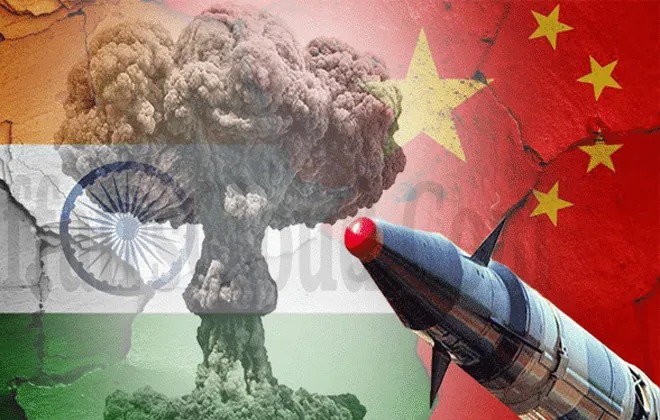 This piece is part of the series, 25 Years Since Pokhran: Reviewing India’s Nuclear Odyssey
This piece is part of the series, 25 Years Since Pokhran: Reviewing India’s Nuclear Odyssey
On 11 and 13 May 2023, India will commemorate the 25th anniversary of the Pokhran II nuclear tests. With the five underground nuclear tests conducted in 1998, India scripted history by declaring itself a full-fledged nuclear weapons state. India first tested a nuclear device in May 1974, dubbed the Peaceful Nuclear Explosion (PNE), which was followed by the Pokhran II underground nuclear test explosions. In the 25 years since then, India has
emerged as a responsible nuclear power on the world stage, as it is the only nuclear weapons country that can engage in civilian trade despite not signing the Nuclear Non-Proliferation Treaty (NPT). Furthermore, since 1998, India’s missile programme has undergone tremendous improvements. Thus, on the eve of the 25th anniversary of the Pokhran II tests, the evolution of Chinese views of India’s nuclear weapons programme merits a discussion.
Historical view
On the political front, China didn’t view India as a co-equal nuclear state after 1974. However, as reports from the Chinese General Staff Department (GSD) indicated, the People’s Republic of China (PRC) made contingency plans for India’s nuclear weapons programme. A prominent Indian security scholar on China
argues that China never recognised India as a nuclear equal. He claims that doing so would have forced the PRC to deal with India as an equal while negotiating on various security and strategic issues including the border issues. This is perhaps why, despite engaging in extensive border and security talks from the late 1980s onwards, China has carefully evaded discussions of nuclear disarmament with India. Furthermore, in the 24 years between India’s PNE and the 1998 underground nuclear tests, China rarely mentioned India’s nuclear programme in a public forum.
India has emerged as a responsible nuclear power on the world stage, as it is the only nuclear weapons country that can engage in civilian trade despite not signing the Nuclear Non-Proliferation Treaty (NPT).
Similarly, even after the 1998 nuclear tests, China has refrained from mentioning India publicly and has not felt any pressure to engage with India in a nuclear dialogue. Xiaoping Yang, a Chinese strategic studies scholar,
argues that India's limited nuclear capabilities and extremely moderate pace of nuclear modernisation (especially technological progress like delivery systems) have yet to match the PRC’s capabilities. This is why China does not believe India to be a nuclear security threat. Furthermore, India's No-First-Use (NFU) doctrine establishes strategic stability in the bilateral relationship. This combination of factors has resulted in China refraining from engaging with India in a nuclear dialogue. Similarly, she also argues that China does not engage in diplomatic negotiations with India on nuclear issues or react to India's nuclear development because India has not yet signed any treaty that would make it a legal and responsible nuclear state under the current global non-proliferation regime.
The majority of Indian research highlights a threat from China as the primary reason for India’s nuclear explosions. However, in the Chinese
understanding, the drivers of India’s nuclear tests are India’s internal insecurity and the need for the United States (US) to recognise India as a major power. “The answer to India’s nuclear weapons can only be found in the Indian government’s great-nation ambitions and the characteristics of militarism and hegemony,”
explains Wang Fuchan, Chinese strategic foreign and security policy expert. Furthermore, an Indian strategic studies scholar has
confirmed that Indian policymakers did not see China as a nuclear threat, and, according to them, India could achieve nuclear deterrence against China by using the bipolar order of the Cold War.
Changing nature of Chinese assessment
In the first decade of this century, the Chinese views on India’s nuclear development were limited to criticism of the Indo-US Nuclear Deal signed in 2008. Chinese policymakers and scholars have regularly expressed concerns over the India-US Nuclear Deal. Chinese
scholars have also highlighted that the deal was driven by “the China factor.” In their opinion, it was a joint effort by the US and India to attain a
balance of power in the Indo-Pacific region in order to contain the PRC.
In the Chinese understanding, the drivers of India’s nuclear tests are India’s internal insecurity and the need for the United States (US) to recognise India as a major power.
However, increasingly in the past decade, with the worsening of India-China border problems and multiple border confrontations across the Line of Actual Control (LAC), a section of Chinese scholars have
acknowledged the increased risk of using nuclear weapons. In their assessment, the risk primarily originates from rising Indian insecurities due to the growing Chinese nuclear and conventional arsenal. Lately, this has increased due to expansion of Chinese nuclear warheads and with the PRC choosing to co-mingle conventional and atomic capabilities. This writer, in an extensive co-authored analysis, has
highlighted that this would likely impact India’s strategic calculations.
The cascading security dilemma in the South Asian region could be entering an accelerated nuclear arms race with China’s expansion of nuclear warheads, advanced delivery systems, and increasing nuclear ambiguity like co-mingling of conventional and nuclear systems. These developments have compelled India to continue with its nuclear modernisation and to operationalise its nascent triad. Some Western nuclear experts
highlight that India’s nuclear strategy, which was extensively Pakistan oriented, is now pivoting towards China. Furthermore, there are also arguments in
Chinese strategic discourse about how the current Indian government—being increasingly under popular pressure to respond to the PRC’s actions on the LAC—is attempting to increase the Indian nuclear arsenal, developing better delivery systems and, more importantly, moving away from the no first use doctrine, which has been the foundation stone of China-India nuclear stability.
The cascading security dilemma in the South Asian region could be entering an accelerated nuclear arms race with China’s expansion of nuclear warheads, advanced delivery systems, and increasing nuclear ambiguity like co-mingling of conventional and nuclear systems.
Need for China-India nuclear dialogue?
Realising the risk of mischaracterisation and inadvertent escalation, a few Chinese scholars have argued that it is an opportune time for China and India to enter into a nuclear dialogue. Tong Zhao, a Chinese strategic and security studies scholar,
argues that the rapid development of India’s nuclear capabilities directly impacts China’s strategic security interests. Thus, China needs to consider ways to ensure the stability of Sino-Indian nuclear relations by engaging in a nuclear dialogue with India. However, a large part of Chinese policymakers and academia still believes that India’s nuclear weapons are for deterrence and international prestige rather than a threat to the PRC. For the Chinese, there is still a huge technological gap in the delivery systems of the two countries, and nuclear talks are a compromise bestowing recognition to India as a nuclear weapons state, and a nuclear dialogue may aggravate Pakistan’s concerns. These concerns compel the PRC not to engage with India in a bilateral nuclear dialogue.
Suyash Desai is a research scholar based out of Taiwan studying China’s defense and foreign policies.
The views expressed above belong to the author(s). ORF research and analyses now available on Telegram! Click here to access our curated content — blogs, longforms and interviews.



 This piece is part of the series,
This piece is part of the series,  PREV
PREV


